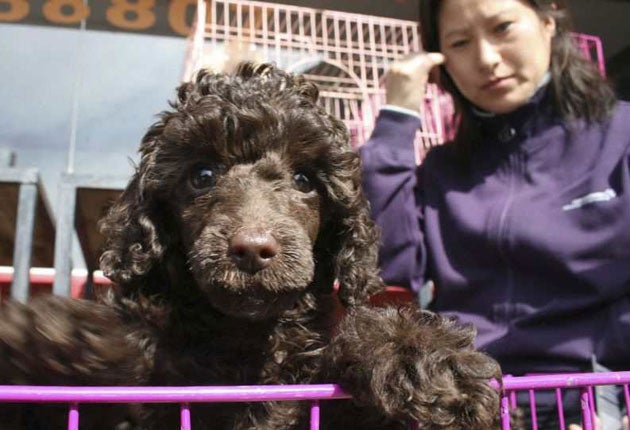It's just a dog's life for pekinese in Beijing
Poodles move in as breed falls out of China's favour

They may be squat, grumpy and fierce but, for 12 centuries, pekinese had always been top dogs in the city they are named after. Now a wider offering of dog breeds means the local mutts are giving way to more exotic types such as chows, poodles and labradors.
In the Imperial Court, the pekinese pooch was revered for its likeness to Chinese lions as depicted in classical sculptures standing guard outside the palaces of the Forbidden City. Emperors carried the toy dogs in their sleeves, and the breed is one of the oldest on earth. They are most commonly gold, with long hair, which is occasionally embellished with a ribbon or two.
Chairman Mao Zedong frowned on pet ownership as bourgeois decadence but in the mid-1990s it began to be tolerated, and licences were issued for smaller dogs inside the city limits. Despite being favoured by successive emperors, the bulging-eyed pekinese is being usurped among Beijing's 17 million people by fashionable new breeds, such as the cocker spaniel or the shih tzu.
Someone who has opted for a foreign dog is Chen Xiang, 58, a retired school secretary, who owns a four-year-old pomeranian. "Since I retired, I have more time to play with my dog," she says. "He is very energetic. I like it very much. It certainly seems as if pekinese dogs are disappearing; the breed is not as valuable as before. And it is not very beautiful, with snub nose and short legs," said Ms Chen.
Her friend Cai Hong, 57, is also a retired teacher and she has a five-year-old shih tzu. She and Ms Chen exercise their dogs together. "We walk our dogs twice a day, in the early morning and in the afternoon, so they can do their business outside and not at home," says Ms Cai. "Pekinese dogs are a little lazy and silent. They do not like to move often. People nowadays raise pekinese dogs less than before because there are many other kinds of dogs people can choose."
Pekinese used to cost nearly £2,500, but now can be bought for 85p as their exclusivity wanes, and even at those low prices the dogs are not being snapped up, pet shop owners say.
There are several legends about how the pekinese came about, the most common being that a lion and a marmoset fell in love, but the lion was too big so it went to Buddha and told him of the problem. The Buddha allowed the lion to shrink down to marmoset size, and the resulting union produced the pekinese. In 1860, when British and French soldiers looted the Summer Palace after the Boxer Rebellion, they found five pekinese belonging to an elderly relative of the emperor and took them away, presenting one to Queen Victoria who somewhat tactlessly called the dog "Looty".
Those who own pekinese are fiercely loyal and loving. Qin Shu, 45, an academic, proudly walks her peke, Wu, through the alley of Beijing. "It's windy and cold today, so I bought Wu clothes to keep him warm," she says. "He is very docile and always listens to what I say. It is easy to raise this kind of dog in the community. But in this community, only four families are raising pekinese dogs; others are raising different kinds of foreign dogs."
Join our commenting forum
Join thought-provoking conversations, follow other Independent readers and see their replies
Comments
Bookmark popover
Removed from bookmarks